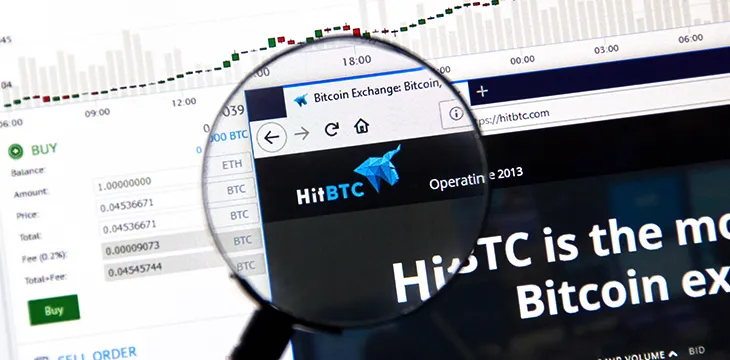|
Getting your Trinity Audio player ready...
|
It’s no secret that the cryptocurrency ecosystem has its share of bad actors and scams, just like what is seen in all sectors of all industries around the world. However, reports that one crypto exchange, HitBTC, is completely insolvent, take things to a new level. The exchange has had a miserable track record this year, although it tries to maintain its slick demeanor. If the company thought the bad press had died down, it’s wrong, and an article released last week sheds new light on why the exchange could potentially be the “largest scale criminally fraudulent entity.”
CipherBlade lead investigator Richard Sanders penned a Medium post last week, asserting that HitBTC is the “longest running, largest scale fraud in cryptocurrency.” He asserts that the exchange could be inflating data to bolster its volumes and, in turn, attract more customers, but that the numbers are too good to be true. The fact that “no external audit or verification of HitBTC’s volume has been conducted” makes the exchange’s claims even more suspect.
Sanders also points to the anonymity of the entire HitBTC team as another reason to doubt its authenticity. The exchange has said that it keeps everyone in the organization under wraps for security reasons; however, this contrasts the public appearances made by “reputable” crypto exchanges.
The reason for the anonymity, according to Sanders, doesn’t have anything to do with security or protection. “He explains, In reality, the HitBTC team is anonymous because when (not if) the day of reckoning comes — whether that is being insolvent to a level they can’t continue the selective scam charade or it is action from authorities — nobody is willing to put their identity behind a fraudulent operation.”
One of the more puzzling aspects of HitBTC’s operations is the fact that it doesn’t require any know-your-customer (KYC) data to be submitted. While some may praise this as being part of the crypto mantra (even though they’re completely wrong), it should be pointed out that the exchange, even if it doesn’t require KYC data, recommends that it be submitted. In other words, the company wants its users to hand over personal information to a group of people that can’t even be identified.
Withdrawal fees on HitBTC, if users can even make a withdrawal, are higher than they are on other exchanges, as well. Given the options available to crypto fans, and the concerns surrounding HitBTC’s operations, it’s surprising that the exchange would have lasted as long as it has.
One of the reasons the exchange has been able to continue is because of apathy on the part of the consumer. Users haven’t taken the initiative to put the exchange in its rightful place. However, this appears to be changing. According to Sanders, who updated his post earlier this week, users are beginning to withdraw their funds and he adds, “HitBTC’s wallets continue to dwindle, with their BTC holdings under 90 BTC at time of writing. Many coins are mysteriously ‘down for maintenance’ on HitBTC — which likely means HitBTC is liquidating them for BTC.”

 07-12-2025
07-12-2025 





